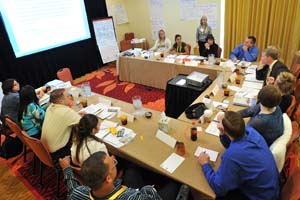By COL Jim Rice, AW2 Director
At each of the last six AW2 Symposiums, we’ve given the delegates a mission: to be the voice of the thousands of wounded warriors, their Families, and their caregivers. Like delegates in years past, 2010 Symposium delegates accepted the mission and got the job done.
On Friday morning, each of the five delegate focus groups briefed senior officials from Army, Veterans Affairs (VA), and other agencies on their top issues. AW2 Veteran John Wright, spokesman for the careers focus group, got the session off to a great start when he plopped Veteran Scott Stephenson’s prosthetic on the podium and told the audience that his group “had a leg up on the rest of the delegation.”
After the briefing, the delegates voted to prioritize the top issues facing Army wounded warriors, their Families, and their caregivers. This year, the delegates selected the following things to be addressed:
- Medically retired service member’s eligibility for Concurrent Receipt of Disability Pay (CRDP)
- Post 9/11 GI Bill transferability to dependents for all medically retired servicemembers
- Mandatory post-traumatic stress disorder/traumatic brain injury (PTSD/TBI) training for VA healthcare staff
- Transfer option from Temporary Disability Retired List (TDRL) to Permanent Disability Retired (PDR) for wounded warriors
- Benefits and entitlements information to wounded warrior primary caregivers

At the 2010 AW2 Symposium, delegates in the medical focus group reflect on their discussions as they prioritize their top issues for the brief-out to senior Army leadership.
Senior Army, MEDCOM, and VA leaders listened firsthand to the delegates talk about these issues and committed to work hard to resolve them.
Now that the votes are in, my team and I will get to work. We’ll coordinate with other programs within the Army, throughout DOD, and other federal agencies, especially those within VA. In addition to their commitment, I promise that AW2 will do all it can to continue to provide personalized support for as long as it takes. It’s our honor and privilege.
This week at the AW2 Symposium, there was a lot of hard work by our delegates—65 severely wounded, ill, and injured Soldiers, Veterans, and their Families. They opened up about experiences they don’t typically share, they tackled hard issues facing wounded warriors, and came together to prioritize areas for change to improve things for those who come next—all while dealing with their own ongoing medical challenges such as burns, amputations, TBI, and PTSD. I was proud of how they continued to serve the Army. Their efforts will impact generations to come.
I thought AW2 spouse Loree Pone put it well, she said, “Delegates had a lot of compassion for other peoples’ issues—we’re here to make things better for the wounded Soldiers that follow. I know that some of these issues will take time to resolve, but I know that the Army will work to fix them as quickly as possible.”
I appreciate all the 2010 Symposium delegates, as well as delegates from all previous AW2 Symposiums, for taking the time to come and tell the Army how we can continue to improve the care we provide to severely wounded warriors and their Families. We heard your concerns, and now it’s time to take action.


This symposium dealt with multiple issues that came up through soldiers requests, blogs and e-mails each of them had merit and all are being addressed at some level. Please never think that your voice is not heard nor addressed at AW2 these leaders care for the soldiers and families and demonstrate that by addressing the issues.
How are the deligates selected for the syposium? I applied but never heard back. Who represents Minnesota?
ISSUE #3 to be addressed-more training on PTSD/TBI for VA Health Care Staff.
How was this addressed and where can I find an update on the status of additional training? What about the service members waiting for years in the WTU for years? Are their outpt therapists getting training also?
There appears to be a serious lack of training/education forthose who are working with the soldiers still in the WTU.
What is the average length of time these therapists stay in this position in the WTU? Is there a point where they burn out, and lose the some of their motivation, considering this is a very intense position?
Helen, I sent your comment to the appropriate person and received the below response. Please do not hesitate to e-mail WTC Strategic Communications at with any additional questions. Thank you.
Thank you for your interest in resolving the Symposium issue on providing PTSD/TBI training to all VA staff. The Army has forwarded this issue to senior leaders at the Department of Veterans Affairs for resolution. While the Army cannot mandate that the VA create a training program, VA leaders understand the importance of this issue and its impact on the individuals faced with these injuries. I will continue following up with the VA to learn about its progress toward resolving this issue. — LTC Deb Cisney, AW2 Symposium Action Officer